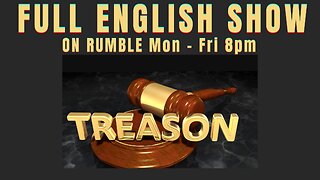Premium Only Content

What is treason? I explain tonight why it is the ultimate common law offence.
Mandatory death penalty. Not even the King can pardon it., or the President!
https://x.com/GregRubini/status/1862540207704191097
https://x.com/elonmusk/status/1861820349270335817
Why Treason is the Ultimate Common Law Offence:
Betrayal of Sovereign Authority:
Treason directly undermines the authority of the sovereign or the constitutional order. In England, this historically meant betraying the monarch, who was seen as the personification of the state.
Threat to National Security:
Acts of treason typically involve aiding enemies or subverting state institutions, which pose an existential threat to the state and its citizens.
Moral and Legal Outrage:
Treason is viewed as a profound moral and legal violation, often requiring harsh consequences to deter others.
Common Law Legacy:
In England, treason has been codified since the Treason Act 1351, which remains a cornerstone of common law. It defined treason as acts like levying war against the king or aiding the king’s enemies.
Laws in England and the USA Forbidding Pardon of Treason
England:
Bill of Rights (1689):
Section 11 explicitly states:
“That no pardon under the Great Seal of England be pleadable to an impeachment by the Commons in Parliament.”
This means the King (or monarch) cannot issue a pardon to someone impeached for treason or other offences by Parliament. This restriction on royal prerogative was a key constitutional check on executive power.
Common Law and Statutory Limits:
While the Crown can traditionally pardon criminal offences, Parliament retains the ultimate authority over impeachment and treason charges. The principle that the monarch is subject to law reinforces that no absolute power exists to pardon treason without parliamentary oversight.
United States:
U.S. Constitution, Article II, Section 2:
The president has the power to grant pardons for federal offences but not in cases of impeachment:
“The President… shall have Power to grant Reprieves and Pardons for Offences against the United States, except in Cases of Impeachment.”
This restriction prevents the executive branch from undermining Congressional authority, especially for crimes like treason.
Federal and State Treason Laws:
Treason is codified in federal law under 18 U.S.C. § 2381. Although the president can pardon federal treason convictions, this is politically sensitive and would likely provoke constitutional crises.
Philosophical and Legal Rationale for No Pardon in Treason:
Safeguard Against Abuse of Power:
By denying the King or President the ability to pardon treason or impeachment, it ensures that the executive cannot protect conspirators who threaten the state or constitutional order.
Parliamentary Sovereignty (Limited by the constitution of England, parliament is the primary legislator):
The restriction reflects the principle of parliamentary sovereignty, ensuring that Parliament’s authority to address treason or high crimes cannot be nullified by the monarch’s prerogative.
Separation of Powers (USA):
The U.S. restriction is grounded in the separation of powers, ensuring that the executive branch cannot interfere with the judiciary or legislative processes.
Conclusion:
Treason’s unique position as the ultimate common law offence arises from its profound threat to the state’s integrity. In both England and the USA, laws limiting the pardon power for treason or related offences reflect a deep constitutional principle: no one, not even the King or President, can shield themselves or their allies from accountability when the foundational trust of the state is betrayed
-
 1:32:15
1:32:15
The Full English Show
4 days agoHalsbury's Laws of England - Treason, Contempt of Statute and Sovereign.
3.29K70 -
 1:04:12
1:04:12
PMG
1 day ago $11.69 earned"I’ll be DRONED for Christmas!"
44.9K11 -
 23:38
23:38
RealitySurvival
1 day agoBest Anti-Drone Rounds For Self Defense
19K4 -
 57:43
57:43
barstoolsports
17 hours agoBest Shot Wins The Game | Surviving Barstool S4 Ep. 7
209K10 -
 1:52:24
1:52:24
Kim Iversen
13 hours agoLuigi Mangione Charged With TERRORISM | Liz Cheney Accused Of WITNESS TAMPERING, Faces 20 YEARS IN JAIL
114K159 -
 6:50:10
6:50:10
Akademiks
14 hours agoJay Z says he aint NEVER been friends w/ DIDDY! Bhad Bhabie lost her man? Travis Hunter Down Bad?
117K14 -
 2:27:04
2:27:04
AirCondaTv Gaming
12 hours ago $24.26 earnedWar Thunder - Tankering Around for That 10 Bomb
63.1K5 -
 4:19:05
4:19:05
SpartakusLIVE
15 hours agoThe MACHINE locks in for 12-hour POWER stream
45.1K1 -
 1:58:40
1:58:40
Robert Gouveia
14 hours agoJ6 Coverup: Prosecute LIZ CHENEY; NY Judge REJECTS Immunity; Trump Breaks Gag?
179K93 -
 2:22:06
2:22:06
WeAreChange
13 hours agoPSYOP Spreads: Drones Shut Down Airport In New York!
113K52